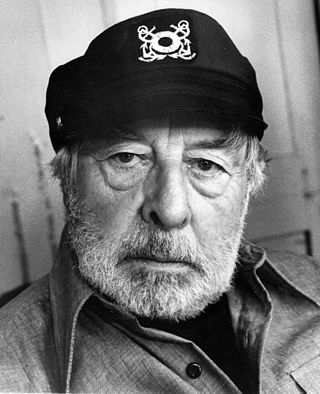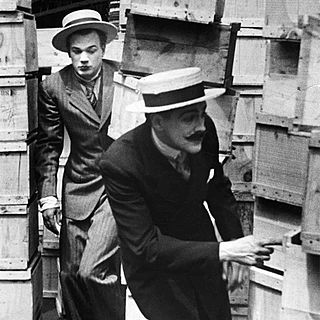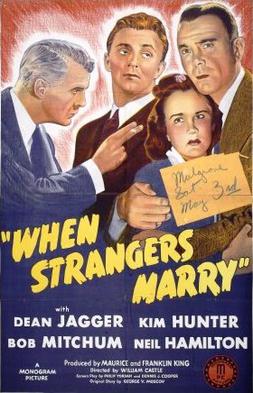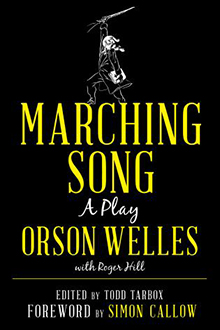Related Research Articles

James Francis Cagney Jr. was an American actor, dancer and film director. On stage and in film, he was known for his consistently energetic performances, distinctive vocal style, and deadpan comic timing. He won acclaim and major awards for a wide variety of performances. Cagney is remembered for playing multifaceted tough guys in films such as The Public Enemy (1931), Taxi! (1932), Angels with Dirty Faces (1938), The Roaring Twenties (1939), City for Conquest (1940) and White Heat (1949), finding himself typecast or limited by this reputation earlier in his career. He was able to negotiate dancing opportunities in his films and ended up winning the Academy Award for his role in the musical Yankee Doodle Dandy (1942). In 1999 the American Film Institute ranked him eighth on its list of greatest male stars of the Golden Age of Hollywood. Orson Welles described him as "maybe the greatest actor who ever appeared in front of a camera".

George Orson Welles was an American director, actor, producer, and screenwriter who is remembered for his innovative work in film, radio, and theatre. He is considered to be among the greatest and most influential filmmakers of all time.

John Houseman was a Romanian-born British-American actor and producer of theatre, film, and television. He became known for his highly publicized collaboration with director Orson Welles from their days in the Federal Theatre Project through to the production of Citizen Kane and his collaboration, as producer of The Blue Dahlia, with writer Raymond Chandler on the screenplay. He is perhaps best known for his role as Professor Charles W. Kingsfield in the film The Paper Chase (1973), for which he won the Academy Award for Best Supporting Actor. He reprised his role as Kingsfield in the 1978 television series adaptation.

Mark Gatiss is an English actor, comedian, screenwriter, director, producer and novelist. His work includes writing for and acting in the television series Doctor Who, Sherlock, Game of Thrones and Dracula. Together with Reece Shearsmith, Steve Pemberton and Jeremy Dyson, he is a member of the comedy team The League of Gentlemen.
Francis William Thring was an Australian character actor in radio, stage, television and film; as well as a theatre director. His early career started in London in theatre productions, before he starred in Hollywood film, where he became best known for roles in Ben-Hur in 1959 and King of Kings in 1961. He was known for always wearing black and styling his home in black decor.

Geraldine Mary Fitzgerald was an Academy Award-nominated, Tony Award-nominated, and Emmy-winning Irish stage, film, and television actress. She was a member of the American Theater Hall of Fame and, in 2020, was listed at number 30 on The Irish Times list of Ireland's greatest film actors.

Arsenic and Old Lace is a play by American playwright Joseph Kesselring, written in 1939. It has become best known through the 1944 film adaptation starring Cary Grant and directed by Frank Capra.

Too Much Johnson is a 1938 American silent comedy film written and directed by Orson Welles. An unfinished film component of a stage production, it was made three years before Welles directed Citizen Kane, but it was never publicly screened. It was shot to be integrated into Welles's Mercury Theatre stage presentation of William Gillette's 1894 comedy, but the film sequences could not be shown due to the absence of projection facilities at the venue, the Stony Creek Theatre in Connecticut. The resulting plot confusion reportedly contributed to the stage production's failure.

The City of the Dead is a 1960 supernatural horror film directed by John Llewellyn Moxey and starring Christopher Lee, Venetia Stevenson, Betta St. John, Patricia Jessel and Valentine Dyall. The film marks the directorial debut of Moxey. It was produced in the United Kingdom but set in America, and the British actors were required to speak with North American accents throughout.

Man in the Shadow is a 1957 American CinemaScope crime Western film directed by Jack Arnold and starring Jeff Chandler, Orson Welles, Colleen Miller and Ben Alexander.
The Devil, appears frequently as a character in literature and various other media. In Abrahamic religions, the figure of the Devil, Satan personifies evil.

When Strangers Marry is a 1944 American suspense film directed by William Castle and starring Dean Jagger, Kim Hunter and Robert Mitchum.

Rupert Davies FRSA was a British actor. He is best remembered for playing the title role in the BBC's 1960s television adaptation of Maigret, based on Georges Simenon's novels.
Sir Michael Edward Lindsay-Hogg, 5th Baronet is an American-born television, film, music video, and theatre director. Beginning his career in British television, Lindsay-Hogg became a pioneer in music film production, directing promotional films for the Beatles and the Rolling Stones. Following his work with these bands, he branched out into film and theatre, while still maintaining successful careers in television and music video production.
Lucifer Rising is a short film by director Kenneth Anger. Although virtually completed in 1972, the film was only widely distributed in 1980, after Bobby Beausoleil delivered the finished soundtrack master.
Charles Higham was an English author, editor and poet.
This is a bibliography of books by or about the director and actor Orson Welles.
Johanna M. Harwood is an Irish screenwriter. She was born and raised in County Wicklow in the Irish countryside. She co-wrote two James Bond films, and went uncredited for adaptation work on a third.

Caesar is the title of Orson Welles's innovative 1937 adaptation of William Shakespeare's Julius Caesar, a modern-dress bare-stage production that evoked comparison to contemporary Fascist Italy and Nazi Germany. Considered Welles's highest achievement in the theatre, it premiered November 11, 1937, as the first production of the Mercury Theatre, an independent repertory theatre company that presented an acclaimed series of productions on Broadway through 1941.

Marching Song is a play about the legend of abolitionist John Brown, written in 1932 by Orson Welles and Roger Hill. It is most notable for its narrative device of a journalist piecing together a man's life through multiple, contradictory recollections—a framework that Welles would famously employ in his 1941 film, Citizen Kane. Although the play has never been professionally performed, an abridged version of Marching Song was presented in June 1950 at the Woodstock Opera House in Woodstock, Illinois, a world-premiere benefit production by the Todd School for Boys. Rowman & Littlefield will publish the play in August 2019.
References
- ↑ McGilligan, Patrick (2015). Young Orson. New York: Harper. ISBN 978-0-06-211248-4.
- 1 2 3 4 5 Wilmington, Michael. Digging Welles, The Chicago Tribune. 5 October 1997.
- ↑ Naremore, James. The Magic World of Orson Welles, University of Illinois Press, 12 Jun 2015. pp.22-26
- ↑ "off west end London | theatre pub, London | south london, London". whitebeartheatre.co.uk. Archived from the original on 2016-10-09. Retrieved 2016-10-02.
- ↑ www.t75.org. "IndieLondon: Bright Lucifer - White Bear Theatre - Your London Reviews". www.indielondon.co.uk. Retrieved 2016-10-02.
- ↑ McGilligan, Patrick "Young Orson" HarperCollins 2015
- 1 2 3 4 Callow, Simon "Orson Welles, Volume 1: The Road to Xanadu" Random House, 8 Jun 2011